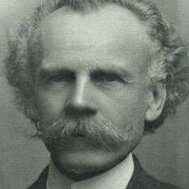Adhémard Leclère

Self-taught orientalist and ethnologist, ardent socialist converted to Georges Clémenceau’s patriotic republicanism, founder of one of the richest collections of Khmer studies outside of Cambodia (in his French hometown of Alençon), Adhémard Leclère (12 May 1853, Alençon, France — 16 March 1917, Alençon) remains a rara avis in the small world of Khmerology.
Born into a working-class family, Leclère was a 17-year old typographer when he joined the French Socialist Party. soon becoming the editor-in-chief of a left-wing periodical, Le Prolétaire (The Proletarian). A few years later, however, he left France for Cambodia with wife and child, becoming ‘résident’ (governor) in the French protectorate of Cambodia, first in Kampot (until 1890), then Kratie-Sambor (1890−1894), Kratie, and finally Phnom Penh, where he served as résident-maire from 1899 to 1903. In total, he spent 24 years in Cambodia.
In his field research, he was helped by his first wife, Henriette Leclère née Brière, and his first daughter Francia, understanding that a man alone could not obtain the confidence of local villagers. After Henriette’s premature death in France, he remarried and started to collect, translate and comment numerous Khmer manuscripts and documents.
Collecting with the same enthusiasm popular tales and artifacts, learning by himself Khmer, Sanskrit and Pali languages (and thus inflaming the ire of established linguists and academics), he wrote extensively about Cambodian mores and traditions, Theravada Buddhism, archeological findings and the many topics that aroused his interest.
In 2011, French historian Grégory Mikaelian published a complete Leclère’s biography (Un partageux au Cambodge), adding to it the extensive inventory of the Leclère Archives deposited at the Musée d’Alençon.
- Related Publications
